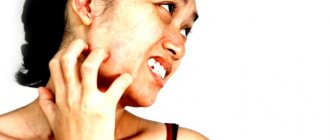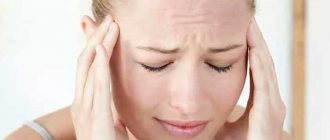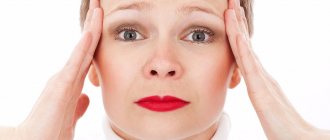Modern demographics in the world are characterized by an aging population.
According to medical classification, the elderly are people over 60 years of age . A common complaint that older people present to their general practitioner is dizziness.
Patients experience a false sensation of rapid rotation of their body in space or the space around them, often accompanied by disorientation and loss of consciousness. The attack is accompanied by nausea and vomiting.
Associated symptoms
In many ways, dizziness in the elderly is associated with degenerative abnormalities in the functioning of the vestibular apparatus, blood vessels, facial nerves, cerebellum and cerebral cortex.
It is worth noting that this symptom is often accompanied by phobias or a general depressed state. Malfunctions in the functioning of the vestibular apparatus are expressed in a person’s distorted perception of the static state of the objects around him. In this case, the patient may experience sudden surges in blood pressure and other symptoms.
- blurred vision;
- feeling of loss of firmness underfoot;
- general weakness;
- lethargy and apathy.
You may be interested in the following article: “Does acupuncture help after a stroke?”
Dizziness is rarely an independent manifestation. It is accompanied by additional unpleasant symptoms. More often it is:
- nausea;
- vomit;
- headache;
- feeling of heaviness in the head;
- noise in ears:
- slurred speech;
- flickering before the eyes (floaters);
- darkening of the eyes;
- weakness in arms, legs;
- trembling of limbs;
- apathetic state.
Depending on the disease that causes vertigo, additional symptoms may vary. The presence of a serious disorder may be indicated by the manifestation of two or three of the listed signs at once.
If dizziness is a one-time occurrence, there is no cause for concern. Systematic unpleasant manifestations are a reason to consult a doctor.
Dizziness of various symptoms is the main complaint of patients. But besides this, there are other symptoms depending on the underlying disease. The most common problems include:
- darkening of the eyes;
- feeling of complete blindness;
- severe nausea or vomiting;
- constant weakness;
- sudden sweating;
- obsessive tinnitus;
- blood pressure surges;
- weakness in the limbs or numbness.
In the event that dizziness is of a psychogenic nature, indifference and apathy are added to the symptoms, and patients may completely lose their sense of reality for some time.
Why do you feel dizzy and stagger when walking?
This condition can occur from taking medications, various diseases (dental or ear disease), due to an unstable emotional background, or due to overwork.
However, there are two main types of this disease: peripheral vertigo and central.
- Peripheral (not systemic). It comes with a sudden headache and lasts from a few moments to a couple of hours. At the same time, the person feels suddenly dizzy. He may also feel loss of balance, sweating, thirst, and nausea. Very often this is accompanied by pain in the ear on one side, as well as significant worsening with sudden movements of the head. There are no focal neurological symptoms.
- Central (systemic). Most often associated with brain diseases. Characterized by an abrupt onset and long-lasting action. A person may feel dizzy from time to time. In this case, there is a lack of coordination of movements for weeks and even months; dizziness almost does not increase when turning the head. Focal neurological symptoms may appear.
When visiting a doctor, it is important to be able to correctly explain the nature of your sensations, which will help you quickly make a diagnosis and apply the appropriate treatment.
If you always feel dizzy, then talk about it, remember exactly when these signs of illness began to appear, and when dizziness is most noticeable (in the morning, evening or night).
It is important to understand that dizziness is not an independent disease, but only a syndrome, and depends on the nature of the disease that caused it.
Methods for treating dizziness in an elderly person
Treatment is always quite individual, and its specific technique is chosen in accordance with the disease that caused dizziness. If possible, the doctor may prescribe physical therapy or folk remedies. If the underlying disease cannot be overcome by such methods, medications are used.
Drug therapy in older people suffering from dizziness has its own characteristics
Drug treatment, first of all, consists of prescribing drugs that tonic blood vessels, improve tissue trophism and eliminate labyrinthine ischemia. The drugs are selected with sufficient caution and their dosage is minimal. In addition, symptomatic therapy is used. Among the main drugs are the following:
- betaserc or tagista - indicated for vestibular dizziness;
- cinnarizine – for disorders in the labyrinth;
- sermion - for dizziness caused by Alzheimer's disease, dementia, atherosclerosis;
- nootropil - for the treatment of dizziness of a psychogenic nature;
- tanakan – eliminates circulatory disorders GM.
Folk remedies
In most cases, folk remedies are used as an addition to the main treatment, and are also recommended by a doctor. An effective remedy is considered to be a mixture of the following herbs - valerian, chamomile and lemon balm. The mixture is prepared simply - equal parts of herbs are poured with boiling water and left overnight. In the morning, honey and apple cider vinegar are added to the product. Taken half an hour before meals for a two-week course.
In general, our ancestors knew well how to treat dizziness in the elderly using natural remedies, using the simplest and most accessible means.
It is the blood-red hawthorn that is most often used for medicinal purposes.
Hawthorn herb, traditionally used to solve vascular problems. Homemade medicine is prepared from dried inflorescences, four tablespoons of which are poured into a liter of boiling water and infused for 15 minutes. Use three times a day before meals.
As a rule, severe dizziness in an elderly person whose treatment was based on taking garlic went away quite quickly. The recipe for the medicine also included ginger - the ingredients were crushed to a pasty state and consumed orally or added as a seasoning.
Any dizziness in the elderly is best treated not with pills or herbs alone, but in a comprehensive manner. In this case, even the most serious disorder can be cured. Therefore, in difficult cases, methods such as:
- exercise therapy;
- reflexology;
- psychotherapy;
- physiotherapy.
For example, exercise therapy uses sets of gentle exercises that help improve the condition of the entire vascular system and the musculoskeletal system. The only condition is regularity of classes. Physiotherapy, special equipment and natural elements can also have a strong effect on the human body - when used correctly. In some cases, homeopathic medicines can also be used.
Dizziness indicates disruption of normal functioning in the body. A common cause of this is problems with the vestibular system. It is located in the temporal region and is similar in appearance to a labyrinth. Its improper operation can cause inconvenience not only to the elderly, but also to the young.
Dizziness in older people is also associated with:
- atherosclerosis of blood vessels;
- pressure changes;
- cardiac arrhythmia;
- diseases of the middle ear that affect the functioning of the vestibular apparatus;
- pinching in the spine.
Periodic vertigo can occur due to previous injuries to the spine and head. This phenomenon also indicates the presence of tumors in the head and other brain lesions.
Meniere's disease
This disease is characterized by a sharp increase in the volume of fluid in the inner ear, which leads to an increase in intra-ear pressure. The disease can cause loss of balance, an unpleasant feeling of buzzing in the ears, and congestion.
Often accompanied by nausea and vomiting.
The most striking symptoms are observed from the musculoskeletal system. At first it is difficult for the patient to walk and navigate in space, then he loses the ability to move independently, his gait becomes unsteady.
All this is accompanied by severe dizziness.
Diagnostics
Even a specialist cannot always say exactly which anti-vertigo pills should be taken for the elderly. The answer to this question is given only after the examination. If complaints of malaise are persistent, a comprehensive diagnosis is recommended. The list of measures depends on the severity of the patient’s condition.
Patient diagnosis consists of:
- Visual examination by a doctor, the patient’s story about complaints.
- General and biochemical blood tests.
- Passing functional tests to check the vestibular system.
- X-ray examination of the brain. Spine.
- Encephalography.
- Computed tomography;
- Magnetic resonance imaging.
After passing all the measures, based on the results obtained, the specialist prescribes treatment. It consists of taking medications and prescribing physiotherapeutic procedures.
Diagnosis and treatment of dizziness in older people is a rather labor-intensive process. Therefore, there is a certain scheme for examining such a patient. It includes:
- Determining the type of dizziness.
- Finding out the reasons for its occurrence.
- Determination of neurological or ENT symptoms.
Additional instrumental examination methods depending on the pathology identified during physical examination and interview.
At the very beginning of the examination, it is necessary to identify the very fact of dizziness. Elderly patients tend to mistake one symptom for another, and the concept of dizziness is given a different meaning - nausea, blurred vision.
The neurological examination of the patient itself is of great importance - pay attention to the precise fulfillment of coordination tasks, determine the state of reflexes. It is necessary to find out the nature of the development of the disease, the factors that provoke it.
For example, a slow, gradual onset is more typical for dizziness of central origin, while spontaneous and rapid onset is more typical for dizziness of peripheral origin.
Local disorders (tinnitus, hearing loss) are characteristic of peripheral vertigo, and symptoms of damage to the cortex and brain stem are characteristic of central vertigo.
Diagnosis is carried out in various body positions, this can also say a lot, for example, they ask the patient to lower his head to the side.
If, when changing the position of the head, there is an increase or sudden onset of dizziness, this indicates that disturbances most likely have arisen in the functioning of the vestibular apparatus, and they are benign in nature.
The patient is asked about all previous inflammatory and autoimmune diseases, intoxications (medicinal, alcoholic), and head injuries. During a neurological examination, great attention is paid to nystagmus.
Nystagmus is involuntary high-frequency vibrations of the eyeballs. Spontaneous nystagmus is checked - when looking straight ahead, then when moving it to the side (gaze-induced nystagmus).
The Hallpike test is performed - the patient sits on the couch with his eyes open, his head turned 45 degrees to the right. Supporting the patient by the shoulders, he is asked to quickly lower himself onto his back so that his head hangs freely over the edge of the couch. Then the same is done with the head turned in the other direction, that is, to the left.
- CT and MRI are performed to exclude neoplasms and demyelinating processes, and attention is paid to the presence of structural changes, congenital or acquired. If there is a suspicion of new or old fractures, x-rays of the skull bones are performed.
- If there are suspicions of vascular disorders, they are referred for Doppler ultrasound of the great vessels of the head and neck.
- A general blood test is performed to exclude infectious processes; if a pathogen is identified, antibodies to it are determined.
- Pure-tone audiometry is performed if the patient has concomitant hearing impairment. The subject is offered to drink “Glycerol,” which allows one to detect improved perception of low frequencies and improves speech perception. If this symptom is positive, then this indicates Meniere's disease, a common symptom of which is attacks of dizziness.
Dizziness, which is combined with hypochondria, apathy, groundless painful sensations, and decreased mental abilities, indicates the presence of a neurological or psychiatric disease.
Epilepsy
Manifestations of the disease are very diverse. In some cases, these are convulsive seizures, in others (in the case of temporal lobe epilepsy) - severe dizziness.
Before a seizure, a person with epilepsy experiences dizziness, which is accompanied by numbness of the head and muscles responsible for facial expressions.
If you look closely at the patient, you will notice that his face is calm and his gaze is empty. After such a state, a seizure usually occurs.
In the case of temporal lobe epilepsy, dizziness, and not seizures, is the only symptom.
Traditional recipes to help with dizziness
In addition to traditional medicine, folk remedies for dizziness in old age help. But only a doctor can prescribe them if the examination does not reveal a serious illness that could cause disorientation in space.
Decoctions
For dizziness, the therapist recommends that patients remove industrially produced tea from their diet and replace it with herbal infusions, which can be brewed in a thermos or in a saucepan, bringing to a boil. You can make a mixture or use only one ingredient, alternating different herbs, flowers, roots, fruits.
| Ingredient for decoction | Properties of a folk remedy |
| Elecampane root | Stabilizes the functions of the vestibular apparatus, returning the patient stability and spatial orientation. Additionally, it removes parasites from the body, which depress overall well-being and can also be the cause of problems with the head. Strengthens the immune system and helps resist infections. |
| Dried kelp (sea kale) | Eliminates slagging in all systems, including the circulatory system, contains a large amount of iodine, strengthens the body, and normalizes the central nervous system. Dizziness disappears due to the saturation of the body with useful substances, including for brain processes. |
| Melissa, peppermint, linden blossom (mix ingredients in equal quantities) | Positively affects the functions of the vestibular apparatus. As a result, even severe dizziness disappears. |
| Hawthorn flowers | Normalizes the functioning of the cardiovascular system, disturbances in which provoke dizziness in older people. |
| Parsley seeds | Eliminates the causes of dizziness in older women caused by the onset of menopause. |
Tinctures
In folk medicine there are many recipes that are prepared based on alcohol-containing liquids. The ingredients are mixed in a glass container, covered with a tight lid and left for 7-10 days in a dark place. Take a course in a small dose.
| Tincture ingredients | Properties of the product |
| Garlic, alcohol. When finished, it is added to milk. | Improves heart function and blood circulation. Removes toxins, parasites, strengthens the immune system. |
| Hawthorn, linden honey, cinnamon, cognac. | It has a positive effect on blood vessels and the heart, eliminating dizziness. |
In order for the treatment of dizziness to be effective, it is necessary to add physical exercise, physical therapy and proper nutrition to traditional medicines and folk remedies. Freshly squeezed juices from carrots, beets, pomegranate, pineapple, young zucchini, added to breakfast, will improve your overall well-being and eliminate any dizziness.
It is worth remembering that dizziness is not a disease, but a symptom of some changes in the body or ordinary fatigue. If a feeling of disorientation interferes with a full life and is accompanied by tinnitus, spots in the eyes and fear of moving, an urgent consultation with a doctor and appropriate treatment is required.
Dizziness in old age is not the norm, just like in any other age. Regardless of how often this happens or if it happened for the first time, the person should be given first aid.
If vertigo is not pronounced, it is worth sitting the elderly person on a chair, giving water and providing a flow of fresh air. To do this, open the window and unfasten the top buttons of your clothes.
If you feel very dizzy, it is better to lie down. For the rest, do everything the same. If the cause of the illness is known, it is necessary to give the appropriate medicine prescribed by a doctor. First of all, it is a sedative. If there are no medical indications, it is better to use herbal preparations that do not have side effects.
If the cause of dizziness is overwork, the best cure is proper rest and rest. Otherwise, taking tranquilizers for nervous tension or suppressing pain with painkillers is not recommended. The main reason for this is the presence of side effects that will increase the discomfort.
If the etiology of the process is unknown and the person does not feel better, it is worth calling a doctor at home or an ambulance.
The first thing you need to do is put the person in a horizontal position, provide an influx of fresh air and make breathing easier for him.
If suddenly dizziness is accompanied by speech impairment, retardation, weakness or numbness of the limbs, then it is necessary to urgently call an ambulance.
No one knows what exactly will go wrong in the body during aging, but prevention of the most common problems can and should be done.
Maintain the performance and nutrition of the brain with nootropic drugs - they are highly effective, low price and highly safe.
Dizziness can be caused by purely physiological reasons: riding a carousel, a sudden change in direction of movement, as well as various diseases: osteochondrosis, neurological disorders and even brain tumors.
Severe dizziness: causes and probable pathologies.
Vascular pathology
Both a strong narrowing and an increase in the diameter of blood vessels contribute to the occurrence of dizziness. When the blood vessels are overly narrowed, it is difficult for the heart to pump blood, and the body lacks oxygen.
The same symptoms are observed when blood pressure is too low, when a person may experience oxygen starvation. Such manifestations are often accompanied by dizziness, general weakness, sweating, and nausea.
Loss of blood provokes a decrease in blood pressure, a decrease in the number of blood cells that are responsible for the delivery of oxygen, which is also accompanied by headaches and dizziness.
Anemia (decrease in hemoglobin and red blood cell count) is often accompanied by weakness, dizziness, and lethargy. Anemia can be congenital or acquired, for example, during long-term dieting for weight loss.
Treatment
Before starting treatment, you should consult your doctor. First of all, you should visit a general practitioner, who, after examination and questioning, can refer you to other specialists (neurologist, endocrinologist, ophthalmologist, otolaryngologist, psychiatrist, oncologist).
Only after examinations is appropriate treatment prescribed. Most often, medications are prescribed to strengthen blood vessels and improve the vestibular system.
Tablets for the treatment of dizziness or pathologies that provoke it are not the only method of therapy. The fight against the disease will be more effective if physiotherapeutic procedures are included in the complex of therapy:
- Reflexology.
- Healing mud.
- Ultraviolet treatment.
Medication
The main treatment is taking medications to strengthen blood vessels, restore tissue metabolism and improve blood circulation. These include “Vazobral”, “Cavinton”, “Sermion”, “Vestibo”, “Tagista” and others. These drugs increase the resistance of blood vessels and the brain to lack of oxygen.
Drugs are often used to improve the functioning of the vestibular apparatus, which, moreover, affect the inner ear. These include:
- "Relanium";
- "Flunarizine";
- "Dramina"
When atrial fibrillation is detected, appropriate medications are prescribed: calcium and beta blockers, anticoagulants, Cordarone, Digoxin, Novocainamide, Propafenone and other anti-fibrillation agents.
If the cause of dizziness is depression, nervous disorders or pathological fatigue, it is advisable to take tranquilizers and other sedatives, for example: “Sonapax”, “Afobazol”, for mild disorders “Novopassit”, “Glycine”, “Motherwort-Forte”.
For nausea, Cerucal, Meclozin, Promethazine, and Bonin are prescribed. In addition to taking medications, daily walks in the fresh air and exercise are recommended.
Folk
When taking medications, it is allowed to use traditional medicine. It is advisable to consult a doctor before this so as not to cause the opposite effect.
The main herbal treatments are soothing decoctions and tinctures:
- Chamomile and mint tea. To prepare them, take a tablespoon of dry herb and pour a glass of boiling water. After 15 minutes, the broth must be strained. If desired and you are not allergic, you can add a teaspoon of honey.
- Another recipe for a soothing mixture: take a teaspoon of chamomile, mint and valerian flowers for half a liter of boiling water.
Brew the mixture in a thermos for 12 hours. It is best to make a decoction before bed, and in the morning, strain and add a teaspoon of apple cider vinegar and honey. Take before every meal. Important! For frequent dizziness and weakness, dry ginger root powder is a great help. Taken in its pure form three times a day before meals. Another tonic is garlic, dried and ground. It is possible to take these powders at the same time. - Hawthorn is excellent for strengthening blood vessels and relieving spasms. An infusion of hawthorn herb prepared at home has a greater effect than a pharmacy tincture with alcohol. To prepare a decoction for the day, a tablespoon of dried herb per 200 ml is enough. boiling water Infuse the decoction for half an hour.
- Using plantain infusion for two weeks will permanently relieve symptoms of dizziness, and a decoction of clover flowers will not only strengthen blood vessels, but also boost immunity.
- If dizziness is accompanied by noise in the head, you need to take a decoction of lemon balm. To prepare it for 500 ml. boiling water, take two tablespoons of lemon balm leaves. Take during the day instead of tea.
Cervical osteochondrosis
It involves damage to the cervical vertebrae and intervertebral discs. Often, after sleeping in an uncomfortable position, people suffering from osteochondrosis experience severe dizziness throughout the day.
And you feel dizzy with this disease because the nerve endings running in the discs can be damaged.
What is the danger of causeless dizziness?
The health risks of dizziness are more complex. A number of diseases, for example, Meniere's disease, vestibular neuronitis, as well as some others, can leave persistent impairments (in the form of dizziness and hearing impairment), which significantly reduces the quality of life in the long term.
Finally, you should also take into account the fact that dizziness in itself is not a pleasant thing. And therefore, despite the small (but present!) danger of dizziness with this symptom, it is better to consult a doctor (especially if the condition persists for a long time).
However, you should also pay attention to the fact that for all types of dizziness, vestibular rehabilitation and vestibular exercises are indicated, which increases the degree of favorable prognosis for various causes of dizziness.
Skull injuries
These are serious mechanical defects that often damage not only the skull, but also the brain itself. This injury is accompanied by dizziness, unbearable pain and increased pressure inside the skull.
Nausea, vomiting and loss of consciousness are also often present. When a concussion occurs, a person experiences all of the above symptoms. Unfortunately, more serious damage often occurs.
How to choose the right drug
Without diagnostics, you should not self-medicate. By taking pills on their own, people, especially the elderly, risk their health. Many medications, including painkillers, tranquilizers, and antidepressants, some of which are sold without a prescription, have side effects.
Important information
Medicines for dizziness in older people are prescribed only by a doctor after undergoing a diagnosis. Malaise may be associated with both fatigue and tumor growth.
Those drugs that are suitable for recovery from fatigue will be ineffective in the case of a neoplasm. The second case involves surgical intervention by specialists - the tumors are not eliminated with medication.
It is not recommended to select medications on your own, since dizziness may also indicate insufficient oxygen supply to the body, ENT diseases, and circulatory problems. In addition to discussing symptoms with a specialist, it is worth clarifying under what circumstances vertigo occurs and what contributes to it.
Even when a doctor prescribes medications, it is worth monitoring the condition. Some pills are not suitable for the body and cause negative consequences. These drugs include groups of analgesics or painkillers, antianginal drugs, diuretics, antibiotics, antihypertensives, non-steroidal anti-inflammatory drugs, antidepressants with tranquilizers, hypnotics and anticonvulsants. We are not talking about all representatives of groups, but about the majority.
Particularly toxic are drugs belonging to the category of glycoside antibiotics. Their prominent representatives are Neomycin with Streptomycin, Kanamycin.
It is imperative to take medications for dizziness in old age if you have health problems. They help restore blood circulation and oxygen supply. Such products belong to the group of nootropics.
Frequent dizziness can be eliminated by taking the following medications:
- Glycine;
- Piracetam:
- Cinnarizine;
- Vinpocetine.
The first drug is different in that it has no side effects. It helps accelerate metabolic processes in the brain, because it is because of their disruption that oxygen starvation occurs. This product is safe even for children. Its constant use helps to completely eliminate dizziness.
With the help of Piracetam, blood flow in the head is normalized. Systematic use leads to the achievement of effect. It is not recommended to use the drug after 16:00 in the evening, as it provokes brain activity, which can interfere with sleep.
Cinnarizine or Stugeron dilates blood vessels in the brain without increasing blood pressure. The drug normalizes the functioning of the vestibular apparatus.
The principle of action of Vinpocetine is to improve blood supply to the brain and oxygen saturation.
If unpleasant symptoms are associated with a disorder of the vestibular apparatus, Betahistine is prescribed. In addition to eliminating dizziness, it affects hearing, improving it.
In addition to the popular nootropics listed above, Cereton is often prescribed. It is also aimed at restoring and improving blood supply to areas of the brain, and also improves memory and concentration.
All medications aimed at eliminating vertigo must be taken for at least three months. Only in this case will it be possible to achieve the desired result. Depending on the cause of the disease, the course of treatment may increase.
Despite the fact that most drugs consist of synthetic components, even among nootropics that effectively eliminate dizziness in older people, there are those consisting of natural components.
Many people prefer natural drugs, arguing that the drugs are less harmful and do not cause side effects. As mentioned above, there are also synthetic drugs like Glycine, which does not have negative consequences.
Helpful information
The advantage of drugs based on natural ingredients is that they are suitable for people of any age, as well as those who are especially sensitive. The most popular drugs for eliminating dizziness are Vinpocetine and Bilobil.
The principle of operation of the first is described above. Its main active ingredient is Vinca minor. Bilobil is developed based on the medicinal plant Ginkgo Biloba. The drug improves the flow of oxygen and blood to the brain, reduces the level of platelet aggregation, and increases concentration and attention.
But the disadvantage of such drugs is that their minimum period of use is 3 months. And the number of techniques varies from one to three.
Brain tumor
A tumor, malignant or benign, is a dense formation that puts pressure on nearby areas of the brain, thereby impairing blood circulation, causing disruption of the functions performed by these areas, the occurrence of edema and increased intracranial pressure.
If there is only one tumor and is localized in a zone of the brain distant from the center, then pathological symptoms often arise on one side - on the side where the tumor is located.
If a person has a brain tumor, they experience short attacks of dizziness, which are accompanied by an unpleasant feeling as if the ground is disappearing from under their feet, or a feeling of constantly falling.
If you often feel dizzy for no reason, the source of this illness may be a brain tumor, especially if it happens every day.
Prevention
The head is spinning for various reasons. If you eliminate them, the dizziness will go away. However, this pathological condition can be prevented. To do this, it is worth observing the following preventive measures:
- Start timely treatment of all those pathologies that can cause dizziness.
- It is worth undergoing a medical examination periodically.
- You need to try to eat properly and nutritiously.
- We must not forget about the benefits of physical activity.
- It is advisable to give up bad habits.
Following these measures will help maintain your health, well-being and mood.
Migraine
The disease is characterized by severe unilateral headache. But few people know that people who suffer from migraines also experience dizziness.
At the same time, it is felt more when the pupils move, when trying to say something, raise or lower the head, lie down or sit down. Any movement during a migraine provokes increased pain and dizziness.
According to statistics, migraines occur more often in women than in men.
Other diseases
Dizziness can also be a sign of diabetes mellitus, diseases of the optic nerve, vitamin deficiency, heart disease, stroke, Parkinson's disease, thrombosis, etc.
Often this symptom is combined with others, and to diagnose the disease it is important to evaluate the entire range of clinical symptoms.
Dizziness often occurs in women when carrying a child, especially in the first months of pregnancy.
Women may also feel dizzy during menstruation or for 1-2 days after ovulation.
There are dozens of illnesses that cause dizziness, and it is difficult to determine which one caused this illness based on this complaint alone. The doctor takes into account the complex of signs of the disease and the dynamics of the patient’s condition.
There is also dizziness, which is actually caused by ordinary events, actions that do not harm a person. These are, for example, riding on a carousel or traveling in public transport, severe stress, exhaustion, fasting, climbing to heights.







